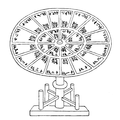Typography facts for kids
Typography is the cool art of making words look good on a page. Think about how a book, a magazine, or even a website looks. Typography is all about arranging the letters, words, and paragraphs so they are easy to read and look awesome!
This art started when printing began. Early type designs were inspired by the beautiful handwriting of scribes and the letters carved into old monuments like Trajan's Column. Over time, type designs changed to fit the needs of books, newspapers, and advertisements.
Typography isn't just about letters. It includes all the symbols in a font, like numbers and punctuation. It also covers the overall design of a page or document. This applies to anything you read, even text on computer screens! A typographer is someone who might design new types of letters, choose the best fonts, and plan the layout of pages and books. While many early printers were also typographers, the term "typography" doesn't mean the act of printing itself.
Contents
How Typography Changed Over Time
Typography in the 20th century was greatly influenced by three big things:
- Modern Art Ideas: The modern art movement, called Modernism, brought new ideas about design. It focused on simplicity and function.
- Learning What Works: People started studying how well different type designs worked. This came from scientific tests and, more often, from businesses. For example, if a book's cover design was changed, companies would compare sales before and after. A new typography design for a book called Roget's Thesaurus almost doubled its sales! Typographers often do small tests themselves to see which designs are best.
- Computer Technology: The invention of modern computers changed everything. Computers made it easier to design new fonts and completely changed how printing is done.
Why Typography Matters
A main goal for a typographer is to make a page that is super easy to read and attractive. It should look good without being distracting. For things like advertising, the typography needs to be noticed first, before anyone even reads the words. This led to many bold and eye-catching typefaces that are available in large sizes.
Related Pages
Images for kids
-
A revolving type case for wooden type in China, from a book published in 1313 by Wang Zhen
-
A sheet by William Caslon showing examples of Roman typefaces he designed
-
A display advertisement for the Encyclopædia Britannica from a 1913 magazine
See also
 In Spanish: Tipografía para niños
In Spanish: Tipografía para niños





